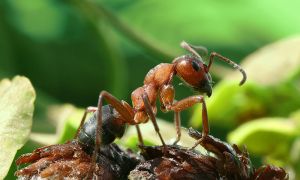You watch an ant in a meadow, laboriously climbing up a blade of grass, higher and higher until it falls, then climbs again, and again, like Sisyphus rolling his rock, always striving to reach the top. Why is the ant doing this? What benefit is it seeking for itself in this strenuous and unlikely activity? Wrong question, as it turns out. No biological benefit accrues to the ant. It is not trying to get a better view of the territory or seeking food or showing off to a potential mate, for instance. Its brain has been commandeered by a tiny parasite, a lancet fluke (Dicrocelium dendriticum), that needs to get itself into the stomach of a sheep or a cow in order to complete its reproductive cycle. This little brain worm is driving the ant into position to benefit its progeny, not the ant’s. This is not an isolated phenomenon. Similarly manipulative parasites infect fish, and mice, among other species. These hitchhikers cause their hosts to behave in unlikely—even suicidal—ways, all for the benefit of the guest, not the host.
Does anything like this ever happen with human beings? Yes indeed. We often find human beings setting aside their personal interests, their health, their chances to have children, and devoting their entire lives to furthering the interests of an idea that has lodged in their brains. The Arabic word islam means “submission,” and every good Muslim bears witness, prays five times a day, gives alms, fasts during Ramadan, and tries to make the pilgrimage, or hajj, to Mecca, all on behalf of an idea of Allah […]. Christians and Jews do likewise, of course, devoting their lives to spreading the Word, making huge sacrifices, suffering bravely, risking their lives for an idea. So do Sikhs and Hindus and Buddhists. And don’t forget the many thousands of secular humanists who have given their lives to Democracy, or Justice, or just plain Truth. There are many ideas to die for.
[…]
The comparison of the Word of God to a lancet fluke is unsettling, but the idea of comparing an idea to a living thing is not new. I have a page of music, written in parchment in the mid-sixteenth century []. The text (in Latin) recounts the moral of the parable of the Sower (Matthew 13): Semen est verbum Dei; sator autem Christus. The Word of of God is a seed, and the sower of the seed is Christ. These seeds take roots in individual human beings, it seems, and get those human beings to spread them, far and wide (and in return, the human hosts get eternal life — eum qui audit manebit in sternum.)
Excerpt from the opening chapter of Breaking the Spell.
Here’s the link to a post I wrote about this book. Read more about lancet fluke here, and watch a video about their parasitic mind control on this link.
[Picture Courtesy: Wikimedia Commons]

The Lancet Fluke infection to Human is rare and can be treated, however, there are other parasites which jumps from animal to Human and play havoc to general heath and do not have effective treatment so far.
Parasites are dreadful (especially if they can infect humans) but fascinating creatures. The Greek root of this word means ‘one who eats at the table of another’ (para = beside + sitos = food) but they not only eat at the table of another, they also eat (or destroy) their host!